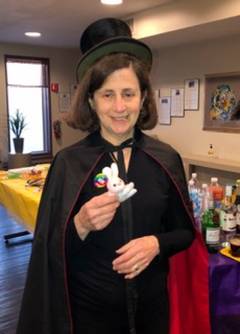Va-Ethannan 5778: Who says?
08/07/2018 09:28:03 PM
| Author | |
| Date Added | |
| Automatically create summary | |
| Summary |
Va-Ethannan 2018
Ben Bowling was this year's valedictorian of Bell County High School in Pineville, Kentucky. Pineville is in the heart of coal country and overwhelmingly supported President Trump in the 2016 election, especially after he promised to bring coal jobs back to America.
Playing to the crowd, Ben said in his graduation remarks, “This is the part of my speech where I share some inspirational quotes I found on Google. ‘Don't just get involved. Fight for your seat at the table. Better yet, fight for a seat at the head of the table.'” He then gave the source of that inspirational quote: “Donald J. Trump.”
The crowd burst into applause, reflecting the President's continuing popularity in that area. But Ben wasn't finished. “Just kidding,” he added. “That was Barack Obama.” The cheers stopped abruptly. The room went silent, save for a lone boo.
It turns out that quote actually comes from a commencement address that President Obama gave at Barnard College in 2012. In that speech, he encouraged the all-female graduates of Barnard to take their rightful place in shaping the destiny of our nation and of the world. Ben found that quote and liked it, but he knew that the crowd was not the friendliest to President Obama. So he decided to be a bit playful with his audience and their reactions.[1]
In our increasingly polarized society, this whole episode could have been repeated in reverse at a different graduation. Perhaps some of you too had a gut reaction to that rather prosaic advice that had little to do with its content, but rather its supposed source. This happens all the time. I've seen all kinds of quotes attributed to famous figures like Mark Twain or Albert Einstein that on further inspection are misattributed. For instance, perhaps you've heard the Einstein quote “Insanity is doing the same thing over and over again and expecting different results.” Problem is, Einstein never actually said it. On a website called Quote Investigator, an intrepid fellow named Garson O'Toole tracks down the actual provenance of such quotations.
Who says something matters a great deal, just as much as, if not more than, what is said. The same exact information or idea can come across in totally different ways depending on who says it and in what context. Many women, in particular, often notice that their ideas are not taken seriously until they are repeated by man. On the positive side, someone's reputation on a given issue can lend their ideas about it added credibility. It is in this sense that it is said that only Nixon could go to China.
We find this phenomenon in our Torah reading, Parashat Va-Ethannan. This portion includes the second version of the 10 commandments, which different in some slight and some significant ways from the version we read earlier in the Book of Exodus. We also get a longer version of the story of the people's reaction to encountering God's revelation. Unlike in the version in Exodus, in this version it appears that the people heard at least part of the 10 Commandments directly from God. “The Lord spoke those words…to your whole congregation at the mountain” (Deut. 5:19), we read.
But then, the Torah continues, the people grew afraid of the potential dangers of encountering God so directly. “For what mortal ever heard the voice of the living God speak out of the fire, as we did, and lived?” they ask Moses. “You go closer and hear all that the Lord our God says, and then you tell us everything that the Lord our God tells you, and we will willingly do it” (5:24).
So, from this version of the story, it seems that initially the people heard some of the 10 Commandments directly from God, but at a certain point, Moses alone heard them and then relayed them to the people. There may even be a hint of this in the text of the 10 Commandments themselves. Notice that at the beginning, God speaks in the first person: “I the Lord am your God” “You shall have no other Gods besides me,” and “For I the Lord your God am an impassioned God.”
But then, at what is traditionally counted as the third commandment, the text switches to talking about God in the third person: “You shall not swear falsely by the name of the Lord you God.” And so on: “Observe the Sabbath day and keep it holy, as the Lord your God has commanded you.” And “Honor your father and your mother, as the LORD your God has commanded you.” Perhaps, then, the people heard the first two commandments directly from God, and then Moses took after for the other eight.
Maimonides, in his epoch-making philosophical work Guide for the Perplexed (2:33), finds a philosophical distinction between the first two and the other eight commandments, corresponding to this shift of person. Maimonides points out that Moses and the people received the first two commandments in the same manner. These two commandments, concerning the existence and unity of God, can be arrived at through reason alone. The people, in other words, could conclude independently that there exists precisely one God. They do not require a prophet to reveal this to them.
The remaining commandments, Maimonides continues, are of an “ethical and authoritative character,” not affirmations of universal truths that a person could discover through reason. These commandments concern social and ethical conventions that, at a certain level, are arbitrary. For example, honoring parents or not stealing depend on social conventions of family and property that are not necessarily so on a philosophical level. Rather, they are mere conventions that allow society to operate justly. These conventions could have been different. For this reason, a prophet had to convey them to the people.
So, there are significant differences between the first two and the latter eight commandments. In terms of form, the first two are phrased as coming directly from God, whereas the latter speak of God in third person. In terms of content, the first two address philosophical questions about the nature of God, whereas the latter address ethical norms that govern society.
Given these differences, it makes sense why the people would have heard the first two commandments from God directly and the latter through the prophecy of Moses. In order to impress upon the people the reality of God that is the basis for all other commandments, they experienced a direct revelation, complete with overwhelming sensations of light and sound, in order to instill reverence among the people. This mass revelation to the entire people became the basis of all of Judaism, so God pulls out all the stops, as it were.
But the remaining commandments address ethical norms, how people should relate to one another. Even the commandment about Shabbat is given an ethical explanation in this version of the commandments. Here Shabbat is not in remembrance of the creation of the world, but of the Exodus from Egypt, and its purpose is to allow everyone, including the Israelites' own slaves and servants, to rest once a week. Since these commandments are about human relations, it follows that they would be given by God, but mediated through Moses's human voice.
Chizkuni, a 13th century French commentator, suggests that Moses spoke these commandments “pleasantly, in Moses's own voice, so [the people] would be able to hear it” (Chizkuni on Deut. 5:24). These laws about human relations, laws that require people to give up something and act with restraint, were conveyed in a human way. A human voice commands other humans to behave ethically to each other. It's as if Moses is saying, “I know these laws are somewhat arbitrary. I know they are asking you to restrain your baser impulses and show respect for others at your own expense. But please, I ask you, as one person to another, this is how God wants us to behave.”
We don't need an overwhelming experience of God to know how to treat one another. We just need the pleasant voice of another person. As we begin to look forward to the High Holidays and the season of repentance, may we always hear that pleasant human voice, and experience God speaking to us through it.
Sat, October 18 2025
26 Tishrei 5786
Photo Gallery
Photo Albums
Upcoming Events
-
Tuesday ,
OctOctober 21 , 2025Women's Rosh Chodesh Group
Tuesday, Oct 21st 12:00p to 1:30p
New Women's Rosh Chodesh Group Tuesdays, 12:00-1:30pm Gather with Cantor Sklar and KTI friends at the start of each month of the Hebrew calendar to learn about the themes and traditions of the coming month. Learn from each other, learn more about each other and better understand the women within our tradition. Enjoy music and lunch together! Please a dairy or parve lunch to enjoy at noon, followed by the discussion at 12:30pm. KTI will provide drinks and dessert. RSVP Appreciated -
Wednesday ,
OctOctober 22 , 2025Rabbi, May I? Modern Responsa
Wednesday, Oct 22nd 10:00a to 11:30a
Wednesdays, 10 - 11:30 AM, KTI Library Ever since Abraham’s famous argument with God, Judaism has been full of debate. Moses and Korah, David and Nathan, Hillel and Shammai, the Vilna Gaon and the Ba’al Shem Tov, Spinoza and the Amsterdam Rabbis . . . the list goes on. No wonder that Judaism cherishes the expression machloket l’shem shamayim, “an argument for the sake of heaven.” Beyond their historical importance, what makes these disputations so compelling is that nearly all of them, regardless of their epochs, are still being argued. The parade of characters spanning three millennia of biblical, rabbinic, and modern disputation reflects the panorama of Jewish history with its monumental political, ethical, and spiritual challenges. This series will examine Jewish responses to exile from the biblical period to our modern day. Considering texts from all genres of Jewish literary creativity, we will explore how the realities and iterpretaions Join as we re-open these timeless debates that lead us to the core of 3,000 years of Jewish conversation. • Justice: Abraham vs. God (October 19) • Holiness and Authority: Moses vs. Korah (November 9) • Inclusion: The Five Daughters vs. the Twelve Tribes (November 30) • Accountability and Morality: David vs. Nathan (December 21) • Resistance: Ben Zakkai vs. the Zealots (January 18) • Law: Hillel vs. Shammai (February 15) • Spirituality: The Vilna Gaon vs. the Baal Shem Tov (March 15) • Boundaries: Spinoza vs. the Amsterdam Rabbis (April 19) • Religious Evolution: Geiger vs. Hirsch vs. Frankel (May 10) • Zionism: Herzl vs. Wise (May 31) -
Wednesday ,
OctOctober 22 , 2025Wrestling with God
Wednesday, Oct 22nd 8:00p to 9:30p
Wrestling with God Wednesdays, 8-9:30 PM Congregants’ homes TBA We need to talk about God. And about how we talk, and don’t talk, about God. It’s a big topic, maybe the biggest. This offering invites adult learners into compassionate inquiry, deepening their relationship to Jewish text through collective exploration. Using the album s*ngs ab-ut g?d [https://open.spotify.com/album/6JEY2AN6awAxNfWwmXX460] by Jewish educator Eliana Light as a starting point, this series blends music, Hebrew text study, and open-ended questions to help participants examine their own connections to the divine. This is sacred work. It’s not about getting it right. It’s about showing up with curiosity, humility, and a willingness to join the long lineage of Jews who wrestle with God. Each session stands alone, but we’d love to have a consistent group as much as possible. Dates: September 10: skyman October 22: shadows November 19: in the silence December 10: if only January 21: lead me back February 11: three steps March 11: beyONEd April 29: the mountains May 20: the name June 17: I rise -
Thursday ,
OctOctober 30 , 2025Coffee with the Rabbi
Thursday, Oct 30th 8:00a to 9:00a
Start your morning with some caffeine and casual or meaningful conversation! Join Rabbi Goldberg for a Coffee Chat! Stop by Rye Ridge Starbucks any of the following Thursdays, between 8-9am: June 12 and 26 July 10 and 24 August 7 and 21 September 4 and 18 October 16 and 30 November 6 and 20 December 4 and 18 -
Saturday ,
NovNovember 1 , 2025Dror Israel Shabbat
Shabbat, Nov 1st 11:30a
Dror Israel Shabbat Dror Israel’s Mirit Sulema, along with two leaders of the Arab Youth Movement NOAL, Tal Tunik and Shadi Habiballa, will speak during a Kiddush lunch about their important work with Arab Israeli youth and bringing Jewish, Arab, and Druze youth together. Saturday, November 1st, approx. 11:30am KTI Social Hall "We eat together, laugh together. We talk about what we think of each other, and what will help bring peace.” RSVP Appreciated
Privacy Settings | Privacy Policy | Member Terms
©2025 All rights reserved. Find out more about ShulCloud






